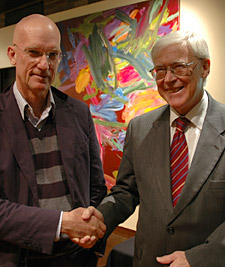 ‘Who do you say I am?’ was question enough to fill the Seymour Centre lounge with Sydneysiders ready to listen to the Archbishop and an author wrestle for the identity of Jesus.
‘Who do you say I am?’ was question enough to fill the Seymour Centre lounge with Sydneysiders ready to listen to the Archbishop and an author wrestle for the identity of Jesus.
Professor John Carroll met with Archbishop Peter Jensen to publicly discuss the content of his latest bookThe Existential Jesus and its roots in the Gospel of Mark.
The "in conversation" was part of “Sydney Ideas", the University of Sydney's international public lecture series, co-presented with Gleebooks.
The book argues that the Jesus found in Mark is not the Jesus typically described in church doctrine.
Mr Carroll, professor of sociology at La Trobe University, referred to Jesus in the intimate café-style setting as a man of "extraordinary charisma" and "the loneliest stranger", a man who was anti-institutional and anti-teaching.
A fresh look at Mark
Dr Jensen said he enjoyed The Existential Jesus, and appreciated Professor Carroll's approach, particularly for the "fresh" look it gave him at the narrative structures used in this first gospel.
"I'm so grateful for John's treatment of this familiar yet unfamiliar text," he says. "To break open the unfamiliar is a great achievement."
Professor Carroll discussed the importance of storytelling in culture, and attributed Jesus with being the biggest story of Western culture.
"We live our lives through stories," said Professor Carroll. "If we can't make narrative sense of our lives, our lives are meaningless."
Stephen Crittenden, presenter of ABC Radio's The Religion Report, hosted the “in conversation” and described Dr Jensen and Professor Carroll as "my two favourite interviewees".
The two speakers agreed on a number of the points raised in The Existential Jesus, in a conversation that was more relaxed than robust.
However Dr Jensen challenged Professor Carroll to reconsider the importance of Old Testament stories, which Carroll said had been superseded by Jesus.
Professor Carroll said ritual and moral teaching are irrelevant to modern society, and that the church’s teaching should reflect this.
"Morality is not our problem today. Meaning is our problem," said Professor Carroll.
Dr Jensen responded by connecting morality with the modern drive for relationship.
"The call for repentance is not a moral call as such; it's a call for a relationship with God," he said.
Dr Jensen added that, while storytelling is important, promises also have a significant role to play in our cultural understanding, as they look towards the future.
"The difficulty with the present age is it's got no eschatology," said Dr Jensen, adding that this has contributed to the loss of meaning in society.
Dr Jensen also asserted that the kingdom of God was "not a place but an activity", and clarified the nature of church.
"I think of church as being two or three gathered together in the name of Christ " that's church," he says.
The archbishop revealed that his favourite gospel was Luke, particularly for its inclusion of accounts such as the Good Samaritan, the road to Emmaus, and the resurrection narratives, as well as Luke's concern for outsiders and the plight of women.





















